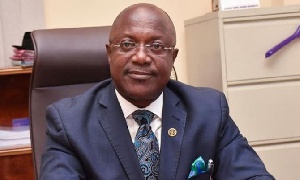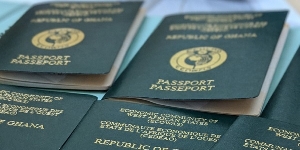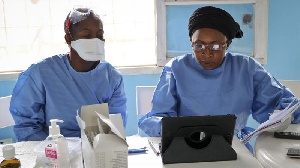The Graduate Students Association of Ghana (GRASAG) has called on the National Identification Authority (NIA) to suspend the ongoing Ghana card registration exercise in the Eastern region for one month to prevent the spread of COVID-19.
Ghana has so far recorded 16 cases forcing the government to place a ban on all public gatherings.
The NIA has come under criticism for going ahead with the mass registration for the Ghana Card with some calling for an end to the exercise.
The Ghana Medical Association (GMA) is one such Association that has asked the NIA to hold on with the Ghana Card registration following the coronavirus outbreak in Ghana.
The GMA said the registration, if not stopped following Ghana recording 16 cases, will further endanger the lives of the staff of the NIA and Ghanaians in general.
A statement issued by President of the GMA, Dr Frank Ankobeah, said the NIA’s continuous registration also violates the order given by the president against all social gatherings.
Meanwhile, the NIA has said its decision to continue with the mass registration exercise after the government’s ban on all public gatherings does not constitute a violation of the president's directive.
Reacting to the criticisms in a Facebook post on Thursday, 19 March 2020, the NIA noted that its “conduct does not violate the President's directives on public gatherings in the wake of the COVID-19 pandemic. On the contrary, the NIA decision is harmonious with both the letter and spirit of the following equally compelling directive” of President Akufo-Addo that “businesses and other workplaces can continue to operate, but should observe prescribed social distancing between patrons and staff.”
It continued that the country is “not in a lock-down, and the business of Government is not expected to cease” reiterating that the activities of the NIA are “consistent with this position and the above directive of the President. The issue is not whether or not NIA should continue with the registration exercise but rather its implementation of the social distancing and personal hygiene protocols.”
But adding its voice to those calling on the NIA to suspend its operation, GRASAG in a statement said the Ghana card registration activity is putting the whole of Ghana at risk.
"It is worrying that, a nation like Ghana that is hugely under resourced is not working under extra precautions to prevent the spread of the disease but risking the lives of everyone by allowing the NIA to continue with its registration activities in the Eastern Region," the statement said.
“Considering the proximity of the Region to Greater Accra, any serious risk assessment will conclude that the Eastern Region is highly vulnerable at this point and encouraging mass gatherings is not only reckless but dangerous,” it added.
GRASAG continued that: “In an attempt to justify why the Authority continues to undertake the registration, some officials of state argue that, the activities of NIA are essential services. In fact issuance of passports is also an essential service but the Director of Passports has suspended such activity. Similarly, education provision is an essential service but the president of Ghana has indeed ordered for the closure of all schools.”
It further continued that: “For a Ghana card, which is not useful at this point in time to be prioritised over the health and well-being of about 30 million Ghanaians is unconscionable and baffling” and called on the "Inter-Ministerial Committee on COVID-19 to immediately call on the NIA to suspend its registration activities for a period of one month.”
GRASAG further "urged all opinion leaders, political actors and the general public to rally behind the President and health care providers” and called for “vigorous public health education on this COVID-19 and not divisive electoral political engagements that breeds suspicions and mistrust for one another.”













